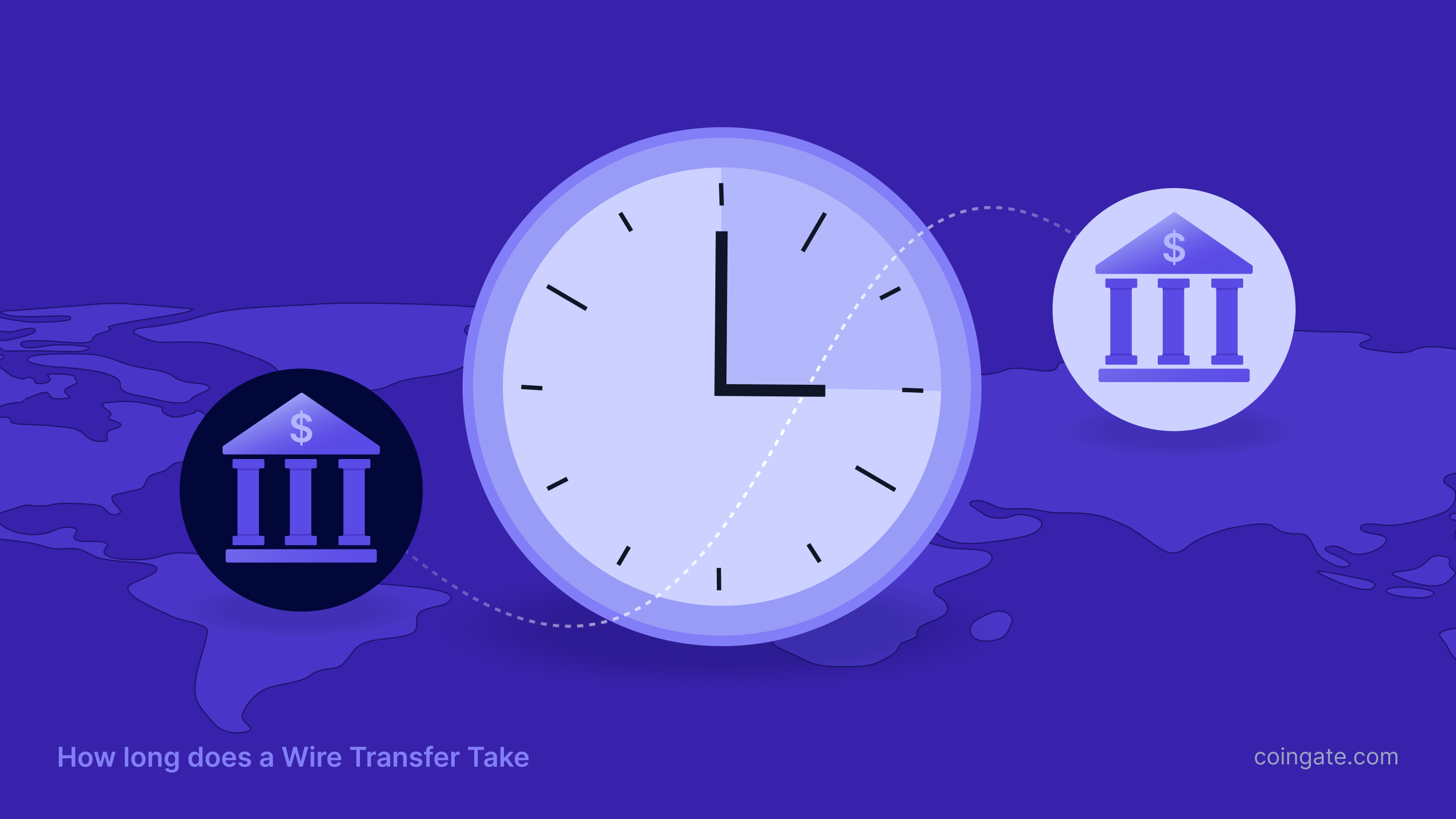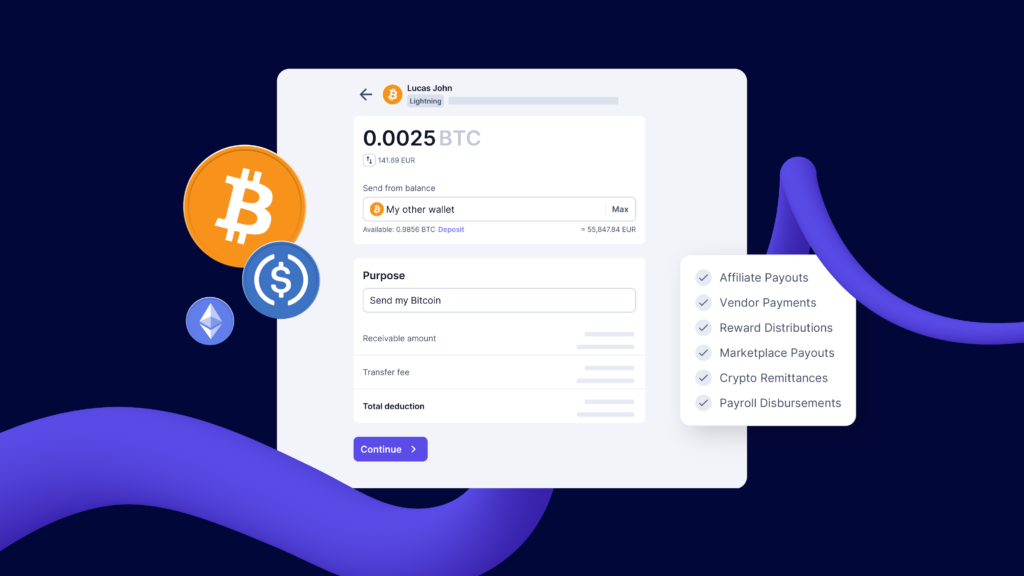
Accept crypto with CoinGate
Accept crypto with confidence using everything you need in one platform.
How Long Does a Wire Transfer Take in 2025

Getting paid or sending money fast is important. Businesses, freelancers, and everyday users rely on payments to arrive quickly and safely.
But even in 2025, wire transfers can still be slow.
Domestic and international bank transfers often come with delays, because of bank hours, rules, or time zones.
On the other hand, cryptocurrency transactions are now the fastest way to send money anywhere in the world.
In this article, we’ll compare how long each method takes and explain why crypto is becoming the better choice. You’ll also learn how to accept crypto payments instantly, anytime.
Key Takeaways
- Domestic wire transfers are faster than before but still depend on bank hours and rules.
- International wire transfers can take several days and face more delays.
- Crypto transfers are the fastest—usually done in seconds, 24/7.
- Bank transfers can be delayed by fraud checks, holidays, or currency conversions.
- Businesses and freelancers are turning to crypto for faster, cheaper global payments.
Quick Answer: How Long Does a Wire Transfer Take?
- Domestic wire transfer: 1 hour to 1 business day, depending on the bank.
- International wire transfer: 1 to 5 business days, sometimes longer for certain countries.
- Crypto transfer: A few seconds to a few minutes—any time, any day.
Domestic Wire Transfer Time
A domestic wire transfer usually takes anywhere from one hour to one business day.

If you send it before your bank’s cut-off time, it can arrive the same day. But if it’s after hours, on a weekend, or on a holiday, it might be delayed.
In 2025, banks will have improved processing times. Still, delays happen due to fraud checks, internal reviews, or system issues. And even when things go smoothly, you’re limited by banking hours.
That’s where crypto transfers have the edge. They work 24/7—no banks, no wait. Many businesses now choose to accept crypto payments for faster results.
International Bank Transfer Time
An international wire transfer usually takes 1 to 5 business days. In some cases, it can take even longer, especially when sending money to or from countries with slower banking systems.
Delays happen for many reasons: time zone differences, currency conversions, compliance checks, and intermediary banks.
Each step adds more time. Even with improvements in 2025, international transfers are still slower and more complex than they should be.
That’s why many businesses now look into what are cross border transactions powered by crypto. These transfers skip banks entirely and complete within minutes—no matter the country, currency, or time.
Crypto Transfer Time: A Faster Alternative
Crypto transfers are the fastest way to send money in 2025. Most transactions complete in seconds or minutes—any time of day, any day of the week.

There are no banks, no holidays, and no middlemen. Whether you’re sending money across the street or across the world, it’s just as fast.
Blockchain networks like Litecoin, Solana, XRP, or the Bitcoin Lightning Network are known for some of the fastest crypto transaction speeds available today.
That’s why more businesses and platforms are choosing to accept crypto payments or use crypto payouts as a smarter, faster alternative to wires.
It’s instant, borderless, and works even when banks are closed.
Want to introduce crypto in your line of business? Sign up for a CoinGate account and get started today!
What Causes Delays in Traditional Transfers (And How Crypto Avoids Them)
Traditional wire transfers, both domestic and international, can be slow. Here’s why:
- Cut-off times: If you miss the bank’s daily deadline, the transfer waits until the next day.
- Bank holidays and weekends: No processing happens when banks are closed.
- Fraud checks: Payments may be delayed while banks review them for security.
- Routing errors: A wrong digit in the account number can hold things up.
- Currency exchange: Converting money adds steps and slows things down.
- Intermediary banks: Each middleman adds time to the process.
Now compare that to crypto transfers. With blockchain, transactions happen directly between sender and receiver—no banks involved. It works 24/7, no matter the day or time.
Delays in crypto are different. They usually come from:
- Network congestion
- Low transaction fees (slower confirmations)
- Delays on exchanges for security checks
But the good news? You have more control. You can speed things up by choosing faster blockchains, raising fees, or avoiding busy hours.
Many businesses prefer this control and choose to accept crypto payments with crypto payment gateways for faster, more flexible and reliable transfers.
Comparing Speed: Domestic vs. International vs. Crypto Transactions
Let’s break it down. Here’s how each transfer method compares in speed, flexibility, and overall experience:
| Method | Typical Duration | Fastest Possible Time | Benefits | Drawbacks |
| Domestic Wire Transfer | 1 hour to 1 business day | Same-day if sent early | Trusted, widely accepted, regulated, often insured | Bank cut-off times, only processed during business hours |
| International Wire Transfer | 1–5 business days | 1–2 days (best case) | Global reach, compliance built-in, supported by most banks | Time zones, currency exchange, intermediaries, long delays |
| Crypto Transfer | A few seconds to minutes | Seconds (e.g. Solana, XRP) | Works 24/7, no banks, instant cross-border, low fees, full transparency | Not yet accepted everywhere, occasional network congestion |
Real Use Cases of Crypto Transfers
Crypto transfers aren’t just fast, they’re also changing the way people do business around the world.
- Freelancers use crypto to get paid instantly from international clients, avoiding long bank delays and high fees.
- E-commerce brands settle global sales faster, without waiting days for money to clear.
- Remote teams use crypto for payroll, especially when employees are spread across different countries and time zones.
Companies like NordVPN, Surfshark, ZenMarket, and Cherry Servers already use CoinGate to simplify and improve the efficiency of cross-border payments.

With cryptocurrency transactions, money arrives in minutes, not days. No waiting for banks to open. No extra fees for currency exchange. Just fast, secure, and borderless payments.
When Should You Use Crypto for Remittances?
Crypto transfers are a smart choice when speed, savings, and global reach matter most.
Use crypto if you need to:
- Send money across borders without delays.
- Pay freelancers or remote workers instantly.
- Avoid high bank fees or slow currency conversions.
- Move money on weekends or holidays when banks are closed.
Crypto also works well for businesses that want instant confirmations and fewer middlemen. It’s fast, cost-efficient, and available 24/7.
Learn more about crypto remittance solutions if you believe this is something your business could benefit from.
How to Speed Up Crypto Transfers
Want the fastest crypto transfer possible? Here’s how to make it happen:
- Adjust the transaction fee: Higher fees often mean quicker processing. If speed matters, it’s worth it.
- Avoid peak network times: Some blockchains, like Ethereum, slow down when traffic spikes. Send during off-hours when it’s less busy.
- Use faster blockchains: Networks like Solana, XRP, or Layer 2 solutions like Lightning (for Bitcoin) offer much faster speeds.
Also, where you send from matters. Some wallets and exchanges add processing time for security.
Crypto Transparency
One of the biggest advantages of crypto transactions is that they’re easy to track in real time.
Every transaction is recorded on a public blockchain. You can check the status, see confirmations, and estimate wait times using tools like:
- Blockstream for Bitcoin
- Etherscan for Ethereum
- Solscan for Solana
This kind of visibility just isn’t possible with traditional bank wires. With crypto, you always know where your money is, and when it will arrive. That’s real blockchain transfer time transparency.
When Should You Still Use Wire Transfers?
Even with all the benefits of crypto, there are times when a wire transfer still makes sense.
For example:
- Large real estate deals
- Regulated B2B transactions
- Traditional banking requirements for certain industries
Banks offer strong oversight, detailed documentation, and insurance that may be needed in specific situations. If regulation and compliance are the top priority, wire transfers are still a reliable choice.
But if speed, flexibility, or global reach are more important, crypto usually wins. It’s faster, cheaper, and works across borders anytime.
Wrapping Up: Is Crypto the Future of Fast Transfers?
In 2025, domestic wire transfers are quicker than before, but still limited by banking hours. International wires remain slow, with delays from time zones, banks, and currency checks.
Crypto beats both. It’s faster, works 24/7, and cuts out the middle steps. For businesses, freelancers, and anyone needing instant global payments, it’s a better way to move money.
If you’re ready for faster, more flexible transactions, it’s time to try CoinGate. Sign up today and see how easy it is to send and receive crypto worldwide.
Wire Transfer FAQs
What’s the difference between traditional and wire transfers?
A wire transfer is a type of traditional transfer that sends money electronically between banks. It’s usually faster but may come with wire transfer fees.
Is a wire faster than a transfer?
Yes, wire transfers are typically faster than regular bank transfers, especially for domestic transfers. But they still depend on the bank’s hours.
What is the cut-off time for wire transfers?
Most banks have a daily cut-off, usually between 3 PM and 5 PM. Transfers sent after that will be processed the next business day.
What is the fastest network to transact in crypto?
Solana, XRP, and the Bitcoin Lightning Network are among the fastest, with some transfers completing in seconds.
How long do SWIFT transfers take?
SWIFT international wire transfers usually take 1 to 5 business days. It depends on the countries and banks involved.
How long do SEPA transfers take?
SEPA domestic transfers in the EU typically settle in 1 business day, sometimes faster with SEPA Instant.
Accept crypto with CoinGate
Accept crypto with confidence using everything you need in one platform.

